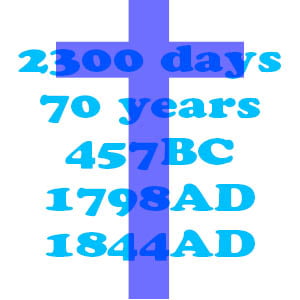11: The Bible and Prophecy – Discussion Starters
- Historicism and prophecy. Do you believe it is a blessing that Bible-believing Christians can follow an uninterrupted Biblical chronology of end-time events? If you do, explain why God chose a logical and time-based description of events from centuries before the first advent of Christ to the establishment of God’s eternal kingdom. How did God deal with people of ancient times who did not have access to the historic line of events leading to the second coming of Christ? Is it easier for us to be saved in this modern age than it was for
 people of Daniel’s day?
people of Daniel’s day? - The year-day principle. What is the year-day principle? Is it followed exclusively by Seventh-day Adventists? How did God reveal this principle in Bible times? Can you think of at least one example of a time prophecy that did NOT involve the year-day principle? Should we always accept time prophecies at their full symbolic value? How would you convince a new believer of the importance of the year-day principle in understanding time elements in important prophecies? Can you explain how the prophecy of 70 weeks in Daniel 9 can only be understood if we follow the year-day principle?
- Identifying the little horn. Are you just a bit uncomfortable about studying the prophecies of Daniel 7 and 8 that describe in some detail the establishment of the papacy? What suggestions could you give to make the identification of the Catholic church as included in Daniel’s dream clear to the general public? Or should you keep such understandings in your heart? Is there a danger in being too careful in concealing the teachings of Catholicism as they compare with the Bible? Or is it a greater danger to proclaim as from a hilltop the faults we discern in that religion?
- The investigative judgment. How does the capture of the pope in 1798 fulfil the prophecy of Daniel 7 and 8 concerning a fierce judgment scene? What happens when the pope is imprisoned in 1798? How is that event predicted in the book of Daniel? When do we as a church believe that Jesus entered the Most Holy Place to begin His work of cleansing the heavenly sanctuary? Are these prophecies like a puzzle even to stalwart Seventh-day Adventists? Or do they become clear with careful—and prayerful—study?
- Typology as prophecy. What is typology? Typology begins with a historic event and points to a greater understanding of that event in the future. How can typology as a teaching concept help us understand ancient stories from the Bible? Consider Paul, for example. What typology did he develop to help his Christian followers understand the spiritual experience of Israelites in the wilderness? The lesson lists six examples of biblical events that could be interpreted as typology. Explain as many as you can and discuss them with other class members.

Comments
11: The Bible and Prophecy – Discussion Starters — No Comments
Please make sure you have provided a full name in the "Name" field and a working email address we can use to contact you, if necessary. (Your email address will not be published.)
HTML tags allowed in your comment: <a href="" title=""> <abbr title=""> <acronym title=""> <b> <blockquote cite=""> <cite> <code> <del datetime=""> <em> <i> <q cite=""> <s> <strike> <strong>